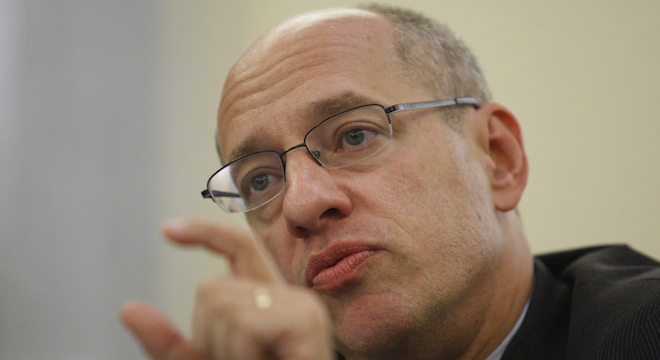It’s been just over a week since the U.S. Federal Trade Commission announced a historic settlement with Google, wherein they declined to press antitrust charges after a 19-month-long investigation into the Internet giant’s search and mobile businesses.
Now, after facing a barrage of criticism, FTC Chairman Jon Leibowitz is speaking out, defending the regulatory agency’s decision-making as legally sound and beneficial for competition and consumers in an exclusive telephone interview with TPM.
“We did what we’re paid to do and what the law requires,” Leibowitz told TPM. “We went after a company [Google] where the law required us to do so, and forwent bringing a case where the law required us not to bring one.”
In the FTC’s Google settlement announcement on January 3, the agency noted that its five commissioners, including Leibowitz, had voted unanimously to close the investigation into Google search and allegations that Google was misusing its dominant position in the U.S. online search market to disadvantage businesses that competed with Google in other areas, such as restaurant reviews. Yelp was one the of the major names calling for a Google antitrust case and criticized the FTC’s decision not to pursue one, as did Microsoft.
“Under facts we found, all five of us, from liberal Democrat to conservative Republican, agreed that the evidence militated against an antitrust case,” Leibowitz explained to TPM. “The fact that we managed to have both Google and Google’s rivals unhappy, in an odd way that’s maybe unique to Washington, that puts us in the right place substantively.”
But search bias wasn’t the only matter the FTC focused on: Arguably more important in the long run is Google’s mobile business. The FTC investigated whether Google harmed U.S. consumers by suing to block sales in America of competing mobile devices, namely those by Apple and Microsoft, for infringing on mobile technology patents Google acquired during its $12.5 billion purchase of Motorola Mobility.
On that front, the FTC found that Google engaged in “unfair conduct” in its patent litigation and voted 4-to-1 to adopt a settlement that prohibits the company from seeking injunctions (sales bans on mobile competitors), and forces the search giant to commit to resolve patent disputes through arbitration first, not through lengthy, expensive court battles.
“We took a pretty meaningful step forward to stop one of the most drastic abuses in patent litigation,” Leibowitz said. “[Google] won’t be able to engage in patent holdup, where the threat of an injunction is used as a ‘Sword of Damocles.'”
As evidence that settlement was already working, Leibowitz pointed to the fact that Google on Tuesday withdrew two patent infringement claims it filed against Microsoft over the XBox.
“That’s part of what we expected,” Leibowitz said.
But as the FTCs own lawyers previously told TPM and as the FTC spells out in its documents about the settlement, Google can sue companies over alleged patent infringement and even seek sales bans against competitors in certain narrow cases, such as if a competitor sues to block Google products, or if a rival refuses to pay “fair and reasonable” (FRAND) licensing fees to use the technology covered in Motorola patents.
Leibowitz called these cases “exceedingly limited defensive uses.”
“We don’t want them [Google] to be able to get injunctions, and we prohibit that except in the one-in-a-million hypothetical,” Leibowitz said, adding that the agency would treat any of Google’s rivals similarly.
“If someone makes a FRAND commitment and reneges, we will go after them,” Leibowitz vowed.
Still, after the FTC’s Google settlement was announced, major U.S. news outlets characterized it as a win for Google: “U.S. Ends Inquiry On Web Search; Google Is Victor,” read the headline on the front page of the Jan. 4th print edition of The New York Times; The Wall Street Journal‘s headline read similarly: “Google Dodges Antitrust Hit.”
“Reporters think of this in some ways as a horse race,” Leibowitz said of the press coverage. “[I]t’s really about doing the right thing.”
Leibowitz said that history would prove the FTC’s moves to be the right ones, but acknowledged that the agency itself may have stoked disappointment by taking on such a big target and by conducting a lengthy investigation.
“Perhaps to some extent we helped to build up expectations,” Leibowitz said. “But I also think complainants created great expectations of their own. I think that as time goes on, more and more people will recognize we did justice.”
But questions have also emerged about the influence of lobbying on the investigation ($25 million from Google), as well as rumors that Leibowitz himself may be soon departing the agency and that his imminent departure could have influenced how the agency concluded its investigation. Leibowitz denied both suggestions and said he was happy to have his job as head of the FTC.
“My sense is that the lobbying makes the companies feel good and lobbyists feel good,” Leibowitz said. “At the end of the day, whether you want to say lobbying had any influence, or canceled itself out because there was lobbying on both sides, if you’re going to do what lobbyists want you to do in a regulatory agency, you’re not doing your job.”
Leibowitz noted that the FTC under his leadership had pursued numerous antitrust actions against the pharmaceutical industry, despite that agency’s massive lobbying presence in Washington.
As for leaving the FTC anytime soon, Leibowitz, who has been with the agency since 2004 and Chairman since his appointment by the President in 2009, offered a diplomatic response.
“I will say I’m really happy with my job,” Leibowitz told TPM. “I love my colleagues and we have done and are doing great things. At some, of point of course, I will think about doing other things. But I have had a number of great jobs in Washington, and I have never had a better or more fulfilling job than this one.”






